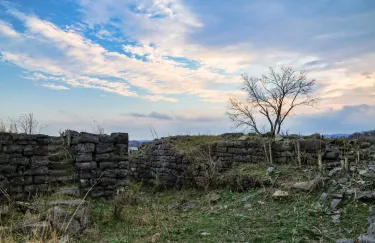For Battle of Nashville 160th, Preservationists Celebrate Protection of More Acreage at Fort Negley
Mary Koik, mkoik@battlefields.org
(Nashville, Tenn.) — The outstanding collaboration between all levels of government and the nonprofit sector that has become a hallmark of Volunteer State historic preservation efforts is again on display, as advocates mark the 160th anniversary of the Battle of Nashville and celebrate completion of a $9.5 million project to protect additional acreage next to Fort Negley Park, a UNESCO Site of Memory due to its iconic place in the region’s history of emancipation. The ambitious effort — successful thanks to federal and state matching grants, nonprofit expertise and monumental municipal enthusiasm — will ensure even greater impact for Metro Nashville’s $12 million investment in phase one of the Fort Negley Master Plan to safeguard cultural resources and improve visitor experience at the existing park.
“Incredible passion from all participating agencies and individuals made this complex effort possible,” said American Battlefield Trust President David Duncan. “It is an honor for the Trust to have facilitated its preservation, and I look forward to completing the final steps that will allow us to transfer it into the outstanding Fort Negley Park.”

The 2.36-acre property on the Bass Street side of the fort was acquired by the Trust after receiving an approximately $4.1 million federal matching grant from the National Park Service’s American Battlefield Protection Program and securing $2.3 million from the Tennessee Civil War Sites Preservation Fund (TCWSPF), administered by the Tennessee Wars Commission, a division of the Tennessee Historical Commission, State Historic Preservation Office. The transaction also featured a $3 million investment by Metro Nashville and factored in a donation from the previous landowner.
This is the second-major effort for the TCWSPF this autumn for a site related to the Franklin-Nashville Campaign, following a recently celebrated $957,500 grant toward a cornerstone parcel near the Commission’s Carter House State Historic Site in Franklin. The presence of two major projects in one season, neither of which could have been completed without state involvement, underscores the importance of that program.
“Since 2013, the TCWSPF has been an instrumental funding source in battlefield preservation in Tennessee, and the Wars Commission is proud and honored to be a preservation partner, collaborating on these legacy acquisitions. The closing of these parcels on the heels of the 160th anniversary of the Franklin-Nashville Campaign makes these acquisitions perfectly timed,” said Tennessee Wars Commission Program Director, Nina Scall.
Nashville Mayor Freddie O’Connell emphasized how this acquisition augments the work about to begin on improving visitor experience infrastructure, upgrading interpretation and stabilizing the historic structure. “It’s important that Nashville honor the history at Fort Negley, and American Battlefield Trust has been a terrific partner in helping us preserve that. It’s exciting to take another step toward the city’s vision in the Fort Negley Master Plan which aims to create a lasting memory of hope and resilience.” Work on phase one of that large-scale project is slated to begin in spring and last 12-18 months.
“For almost a century Nashville leaders have envisioned a large park located almost in the center of our downtown: Fort Negley and St. Cloud Hill,” said Friends of Fort Negley President Cyril Stewart. “World War II stalled that effort, and the would-be park fell into disuse, overgrown and inaccessible. But now, the vision will finally become a reality, a robust 66-acre park accessible to all.”
Built by Union forces during the Civil War, Fort Negley may not have played a decisive role in combat for control of the city, but it has become a major Nashville touchpoint in the decades since. It has faced 21st-century battles that pitted conflicting visions for a growing city against an iconic place integral to its past. In just the last five years, large-scale mixed-use development and an arboretum connected to the neighboring Adventure Science Center were proposed on portions of the historic park property.
The Trust was just one of many regional and national organizations that rallied to Fort Negley’s defense, citing its unique story. The labor to build it was largely performed by the formerly enslaved who flocked to contraband camps near Federal lines and were pressed into the harsh service. Many died in the process, and some remains may still lie in the ground in and around Fort Negley Park. The finished fort was defended by regiments of United States Colored Troops, many of whom remained after the war creating a vibrant community that lasted until the building of the nearby federal Interstate forced them out. In recognition of this important narrative, Fort Negley is the first American site nominated for the United Nations Educational Scientific and Cultural Organization (UNESCO) Slave Route Project.
The American Battlefield Trust is dedicated to preserving America’s hallowed battlegrounds and educating the public about what happened there and why it matters today. The nonprofit, nonpartisan organization has protected more than 58,000 acres associated with the Revolutionary War, War of 1812 and Civil War, representing more than 160 sites in 25 states. Its 350,000 members and supporters believe in the power of place and the continued relevance of history as a means to fully understand our rights and responsibilities as Americans. Learn more at www.battlefields.org.





